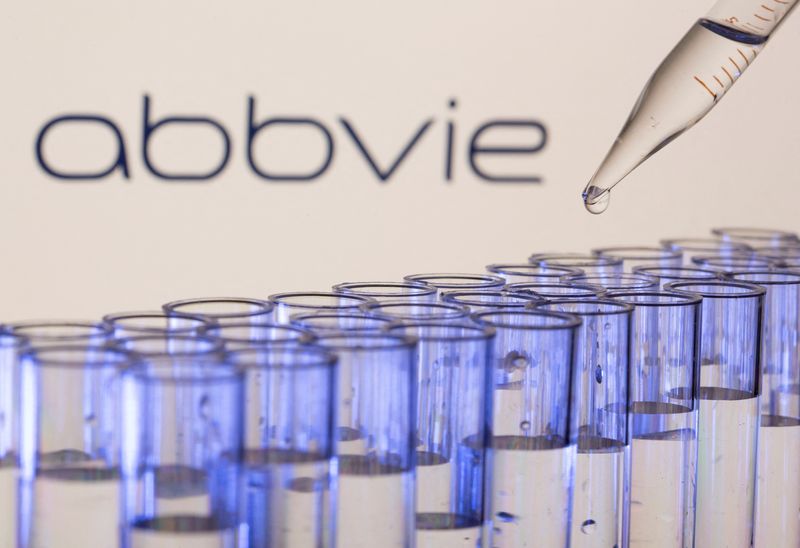By Patrick Wingrove
(Reuters) - AbbVie’s top-selling arthritis drug Humira has held onto more than 80% of patients after facing nine lower-priced rivals in the U.S. in the last year, raising questions about whether the market for prescription biosimilars can survive in its current form, drug pricing experts and analysts say.
Humira, which lists for almost $7,000 a month, is the first top-selling drug to compete with a slew of biosimilars, which are close but not exact copies of branded biologic medicines.
But after their launch last year, industry middlemen known as pharmacy benefit managers determined patient access with little incentive for doctors to switch to alternatives, they said.
Biosimilars were available at lower prices than Humira through the three largest benefit managers, CVS Health’s Caremark, Cigna (NYSE:CI)'s Express Scripts and UnitedHealth Group (NYSE:UNH)'s Optum Rx.
At least seven drugmakers offered sharply discounted prices, but few patients used them until CVS removed AbbVie (NYSE:ABBV)'s Humira from its list of covered drugs.
Regulatory reform is needed so patients can more easily access biosimilars and draw rival drugmakers to develop them, said Stacie Dusetzina, a health policy professor at Vanderbilt University.
“It's not clear to me there's any incentive at all for companies to spend their time and money creating biosimilars. And if no one will, then the price of the brand would never come down,” she said.
The biosimilar industry is advocating for regulatory changes, saying $6 billion in potential savings have been lost since the launches.
AbbVie declined to comment, but has previously said it conceded on price to get equal access for Humira alongside biosimilars on lists of covered drugs, and expects 36% U.S. sales erosion for its drug this year. At its peak, annual sales topped $22 billion.
Unlike generic drugs, the FDA only allows some biosimilars to be swapped for the branded medicine by a pharmacist. Most must be specifically prescribed.
Last year, a bipartisan group of lawmakers backed legislation to make it easier to interchange biosimilars. The government and lawmakers have also called for reforms and are looking closely at benefit manager deals with drugmakers.
When an anticipated six biosimilars of Johnson & Johnson’s $11 billion Crohn’s disease drug Stelara hit the U.S. market starting next year, private healthcare insurers will likely repeat the Humira playbook, drug pricing experts said.
J&J (NYSE:JNJ) Chief Financial Officer Joe Wolk told Reuters in April that the Stelara biosimilar market is likely to unfurl similarly to Humira’s given benefit manager contracting practices and doctor and patient resistance.
“Over 75% of our business comes in either Crohn's disease or ulcerative colitis, which are serious illnesses where the patients or the physicians treating them tend not to want to disrupt the therapy,” he said.
Spokespeople for Express and Optum, asked about Humira biosimilar launches, said they offered several options to give patients a choice of medicines, helping lower costs for their employer and insurer clients.
CVS Chief Medical Officer Sree Chaguturu said in an interview that the company kept covering Humira while determining which manufacturers had high-quality biosimilars with reliable supply. It now covers a Sandoz (SIX:SDZ) biosimilar and a co-branded Humira, both from its new Cordavis pharmaceutical unit.
WORTH THE WAIT
Benjamin Rome, a drug pricing researcher at Harvard Medical School, said that because biosimilars are not exact copies like generics, pharmacists need more information about the safety of switching medicines.
Zachary Wallace, a rheumatologist at Massachusetts General Hospital, is one of four doctors who told Reuters they had begun regularly prescribing Sandoz’s Hyrimoz biosimilar when CVS stopped covering Humira.
They said they did not want to prescribe unfamiliar biosimilars unless they were sure patients were benefiting from lower list prices.
“I would have to see that those discounts actually got passed on to patients in some way,” Wallace said.
In the U.S., drugmakers have a list price for their drugs that can be discounted for employers and insurers who receive after-market volume based discounts, called rebates.
ZS pharmaceuticals consultant Komal Gurnani predicted that as many as five Humira biosimilars will exit the market within a few years before they get to her forecast of $400 million in peak sales.
She expects companies with other planned biosimilar launches, like Amgen (NASDAQ:AMGN), Sandoz and South Korea’s Celltrion, to leverage their other products to negotiate favorable terms with insurers and stay in the market.
Sandoz and Celltrion, which have long sold Humira biosimilars outside the U.S., said they were committed to the U.S. market.
Celltrion Chief Commercial Officer Tom Nusbickel said the company is willing to wait years to gain a significant U.S. foothold. “We have a last-man standing approach to this market,” he said.
Indian drugmaker Biocon, which sells a Humira biosimilar in Europe, said it too was committed to the U.S. market, as did Pfizer (NYSE:PFE), which launched its biosimilar in October.
Boehringer, which reduced its U.S. sales staff earlier this spring, Teva and Organon said they are committed to the U.S. Fresenius and Amgen declined to comment and Coherus could not be reached for comment.

Organon biosimilar head Jon Martin said it would be worth the wait even if biosimilars took six years to gain 50% market share as they did when J&J’s arthritis drug Remicade faced rivals starting in 2016.
“That's what gives us some optimism,” he said.